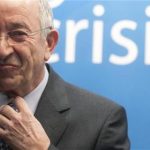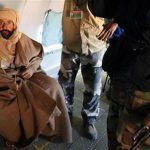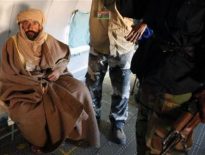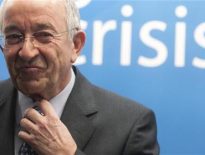(Reuters) – When the Obama administration declared it wanted
to put suspects involved in the September 11, 2001, attacks on trial in a New York federal courtroom, cries of outrage
erupted in the U.S. Congress.
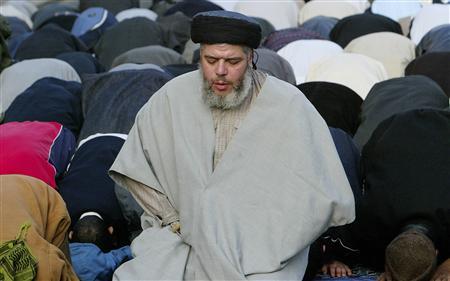
Hamza al-Masri leads prayers outside the North London Central Mosque in the Finsbury Park area of London in this January 24,
2003 file photograph. REUTERS/Toby Melville/Files
Both Democrats and Republicans
worried this would put New York City in the crosshairs for new al Qaeda attacks. Congress eventually passed a law forbidding
the administration from trying alleged September 11 conspirators, or any other militants detained at the U.S. military
facility at Guantanamo, Cuba, in U.S. civilian
courts.
But when it comes to the cases of five alleged top militants whose extradition from Britain to the United
States a European human rights court approved on Tuesday, the White House will have no choice.
British and U.S.
officials said the Obama administration had given ironclad assurances to Prime Minister David Cameron’s government that the
five militants would be tried in the U.S. federal court system, and they would not face a potential sentence of capital
punishment.
Three of the five to whom the European court ruling on Tuesday applied – Abu Hamza, Khalid al Fawwaz and
Adel Bary – have all been under indictment for years in the U.S. Southern District of New York.
Law enforcement
officials said that prosecutors, whose courtrooms are only blocks from the site of the World Trade Center towers downed in
2011, are prepared to try the cases if the suspects finally are extradited from Britain.
The officials noted that
several notorious militants, including Ramzi Yousef, alleged mastermind of the 1993 World Trade Center bombing, were
prosecuted and convicted in the same courts and are now serving lengthy U.S. prison terms.
Some are being held in
ultra-secure “Supermax” prisons where the European court said U.S. authorities might be entitled to jail the five extradition
subjects if they are convicted.
But for political, as well as other reasons, civilian trials for alleged militants
lately have been the exception rather than the rule in high-profile counter-terrorism cases.
Tuesday’s European court
action appears unlikely to permanently change that – or alter President Barack Obama’s preferred approach in fighting
militants, which centers on clandestine operations and lethal drone strikes.
Indeed, just last week, the Pentagon
announced that the accused September 11 mastermind, Khalid Sheikh Mohammed, and a handful suspected co-conspirators will be
tried before a U.S. military tribunal at Guantanamo, and could face the death penalty.
1998 U.S. EMBASSY
BOMBINGS
The extradition cases demonstrate how what President George W. Bush once called the “global war on terrorism”
has evolved in the years since the September 11, 2001, attacks.
In fact, the cases of all the men whose extraditions
the European court approved have their roots in events that took place before the September 11 attacks.
Two of them,
Fawwaz, a Saudi citizen, and Bary, an Egyptian, face charges in connection with 1998 bombings of U.S. embassies in Tanzania
and Kenya, a case which also included the first U.S. criminal charges against Osama bin Laden. At the time of the embassy
attacks, Fawwaz was alleged by investigators to be acting as one of bin Laden’s principal Western spokesmen.
The
charges against the best known of the five – a former London-based preacher known as Abu Hamza – also date back before 2001.
The Justice Department alleges that he was involved in a conspiracy to take hostages in connection with a 1998 attack in Yemen in which four hostages died, and also
claims Abu Hamza was involved in a scheme to set up a training camp for militants in Bly, Oregon, in 1999 and
2000.
Once evidence began to accumulate after the September 11 attacks, – some of it in the form of Abu Hamza’s
public behavior – he was connected to Zacarias Moussaoui, a French militant linked to some of the September 11 suspects, and
Richard Reid, a British militant who tried to attack a U.S.-bound airliner with a bomb hidden in his shoe.
Under U.S.
pressure, Abu Hamza, who has a hook for one of his hands which he said was blown off in Afghanistan, was eventually driven out of his pulpit at the
Finsbury Park mosque in North London. U.S. authorities did not file charges against him until 2004.
The two other
suspects whose extradition was given a green light both face trial in federal court in Connecticut for offenses that also
pre-dated the September 11 attacks.
Babar Ahmad and Syed Ahsan are accused by U.S. authorities of operating pro-al
Qaeda websites from 1997 to 2004, and also of being in contact with a sympathetic U.S. serviceman.
All five suspects
were detained in Britain for years without trial. The case of Ahmad, detained for seven years, became a cause celebre for
human rights activists and some British members of Parliament.
From the point of view of U.S. counter-terrorism
officials the cases surrounding the five are too dated to be relevant to their current efforts.
Still, the Obama
administration would undoubtedly like to use any U.S. trials of the extradited subjects to showcase the openness and equities
of the U.S. legal system.
The cutting edge of the Obama administration’s counter-terrorism policies, however, is not
the criminal justice system, but the use of clandestine operations, and particularly expanding drone warfare campaigns,
against militants in suspected sanctuaries in Pakistan and Yemen.
Even smooth extraditions and U.S. trials of the
suspects held in London are unlikely to alter that policy.
(Reporting by Mark Hosenball; Editing by Jackie Frank)


